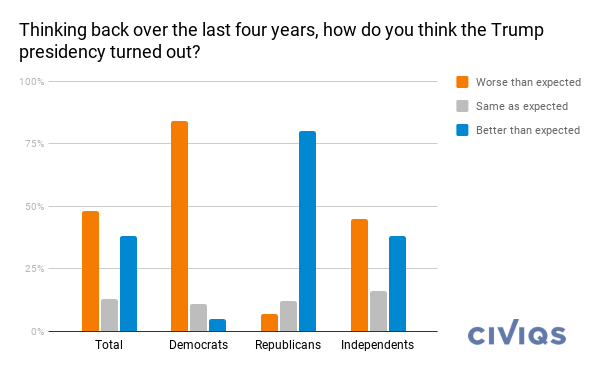Report: Plurality of Americans Think Trump Presidency Has Been Worse Than They Expected
The October 2020 Daily Kos/Civiqs Poll asked 1,359 adults in the United States about the first presidential debate, President Trump's tax returns, the Supreme Court nomination process, the U.S. coronavirus outbreak, and more.
The 2020 Election
Last week saw the first presidential debate between President Donald Trump and Vice President Joe Biden. A plurality of Americans (41%) think that Biden won the debate. Another 28% handed it to Trump, while 27% decided neither can claim victory. While 80% of Democrats think Biden was the victor, only 61% of Republicans think Trump won.
Most Americans are firmly set on their presidential candidate of choice, with less than a month remaining until Election Day. Only 4% have changed their mind in the past few weeks, or are even considering switching who they will vote for. Just 5% are unsure. More Democrats (6%) than Republicans (1%) have already voted early.
Both Democrats and Republicans are confident in their candidate's chances of winning, but Democrats express more uncertainty. Among Republicans, 85% think Trump will win, 5% think Biden will win, and 9% don't know. For Democrats, 75% think Biden will win, 8% think Trump will win and 17% don't know. Independents are the most uncertain, with 27% having no expectation about which candidate will win. Overall, a plurality of Americans (41%) think that Trump will secure re-election, while 39% think that Biden will win. One in five (19%) don't know either way.
Looking back on the past four years, a plurality of Americans (48%) think that the Trump presidency has turned out worse than they thought, including 84% of Democrats, 45% of Independents, and 7% of Republicans. An additional 13% thought it has been about what they anticipated; 38% say it's been better than what they expected.

President Trump, In the News
A recent New York Times investigation reported that President Trump paid $750 in federal income taxes in 2016 and 2017, and zero net federal income taxes in eleven of the last fifteen years. Most Americans know about the report, with 66% having heard a lot about the story. However, over half (58%) of Republicans and nearly two-thirds (64%) of frequent Fox viewers do not believe that the New York Times report is true.
Following President Trump's refusal to denounce white supremacy during the last presidential debate, a majority of Americans (51%) believe that Trump is a supporter of white supremacist movements in the U.S. Democrats are nearly united in seeing this, with 91% saying that Trump supports white supremacist movements. Majorities of Black (87%) and Hispanic (66%) Americans agree that Trump supports white supremacy. Republicans, however, do not believe this is true -- 85% say that Trump opposes white supremacist movements.
Americans: Supreme Court Nomination Should Wait
With the passing of Supreme Court Justice Ruth Bader Ginsberg, President Trump has nominated Judge Amy Coney Barrett as her successor. Americans are evenly divided on this selection: 43% think that Judge Barrett is a good choice to join the U.S. Supreme Court and 43% do not, with 14% undecided.
The majority of Americans (52%) want the Supreme Court nomination process to re-start with the winner of the presidential election, with a Senate vote next year. Despite this, Republicans want to press ahead: 91% want a vote in the current Senate. In contrast, only 45% of Americans overall want a confirmation vote right away.
Reluctance About a COVID-19 Vaccine
As the coronavirus pandemic continues to affect the lives of millions, 28% of Americans have either had COVID-19 or know someone who has had the virus. An additional 16%, including 34% of Black Americans, know someone who has died from COVID-19. All of these numbers represent an increase from the September survey.
Despite the spread of the pandemic, Americans are increasingly skeptical about a COVID-19 vaccine. In July, 45% of Americans said they would take a vaccine. Now, only 34% plan to take it. A third (33%) are unsure, and 33% are not planning to take a vaccine at all. While Democrats are more likely to take a vaccine than Republicans, their desire to do so has dramatically declined since July. Two-thirds (61%) of Democrats planned to take the vaccine three months ago, but only 41% are planning to take it now.
Americans are pessimistic about how much longer it will be before the coronavirus epidemic settles down, and things in the United States return to normal. In April, most Americans (55%) believed that the coronavirus pandemic would be over in a couple months. Now, fully 47% of Americans think it will take six months or more, up from 44% in September; 23% think that things in the United States will never get back to normal. Only 15% think that a recovery will occur any sooner than three months from now.
Civiqs surveyed 1,359 adults in the United States from October 2-5, 2020. The survey was conducted online, among selected members of the Civiqs research panel. Sampled individuals were emailed by Civiqs and responded using a personalized link to the survey at civiqs.com. The survey results are weighted by age, race, gender, education, party identification, and region to be representative of the population of adults in the United States. The general design effect due to weighting is 1.06. The survey has a margin of error of ±2.7% at the 95% confidence level, accounting for the design effect.
Download the survey methodology and crosstabs
Interested in conducting a survey? Speak with a Civiqs Analyst.
Want Civiqs updates in your inbox? Sign up for our newsletter, Immediate Reaction.